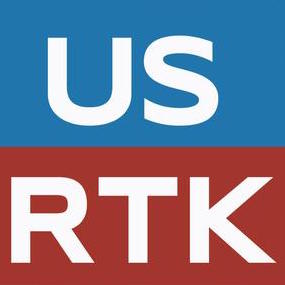
Real Organic Project signs Groundbreaking Partnership with Germany’s Naturland
(From l. to r., Steffen Reese, CEO of Naturland; Linley Dixon, co-director of the Real Organic Project; Dave Chapman, co-director of the Real Organic Project; Hans Bartelme, vice president of Naturland. Photos courtesy of Naturland.)
How Organic Insider operates: We accept no advertising, we have no paywalls and we make our newsletters free to everyone because vital information about our industry needs to get out to as many people as possible. Please consider supporting our work, whether you are an individual or a company. Thank you so much.
When the Real Organic Project (ROP) launched in 2018, small organic farmers across the country saw it as their best — and only — hope to save the movement that they created.
After years of fruitless appeals to the National Organic Standards Board to have the rules enforced, no longer could these pioneers sit by and witness both their own financial demise and the weakening of industry standards, with the USDA turning a blind eye to organic factory animal farms and continuing to allow hydroponics in organic, a growing method that clearly violates section 6513 of the Organic Foods Production Act of 1990.
Just the other day, ROP took a gigantic step forward to accomplishing its goal by signing a groundbreaking partnership with Germany’s Naturland, an entity that certifies over 140,000 organic farms around the world.
“Without question, this joint venture will help mainstream ROP,” said Dave Chapman, co-director of the Real Organic Project. “Naturland, which is 40 years old and also a farmer-led organization, has the best reputation of any add-on label that I have ever come across, and working together only makes both organizations stronger.”
“There are more than three million organic farmers outside of the U.S., and what happens there impacts us. Surely, what happens here impacts them. Ultimately, this partnership was driven by the USDA’s unwillingness and inability to protect organic integrity, something that affects organic farmers everywhere.”
BRANDS CAN SOON BE CERTIFIED
The Real Organic Project is an add-on label that requires USDA organic certification as a baseline and then prohibits things such as organic factory farms, hydroponics and split organic farms (part of the farm being organic, part of the farm being conventional/not in transition). What makes ROP really stand out is that its executive, standards and advisory boards are a who’s who in the history of organic farming and rulemaking in the U.S.
Until this point, ROP has been squarely focused on certifying organic farms, of which it has certified over 1,000 farms and at zero cost to the farmers. While some ROP-certified products can be found at select coops, independent natural grocers and national supermarket chains across the country, they are not widely available just yet.
This partnership with Naturland aims to change that.
Not only will it have a processing standard, opening it up to consumer packaged goods companies who wish to get certified, but it will allow ingredients from both ROP and Naturland-certified farms.
Given Naturland’s massive presence around the world, U.S.-based organic brands can tap into an already-certified, large organic supply chain, and these same brands can also encourage their international suppliers to get Naturland certified if they are not already. Furthermore, once the domestic market develops for ROP products, it will help support international farmers seeking to reach U.S. consumers.
Having been in place for decades, the standards of Naturland actually go beyond the Real Organic Project. The certification has standards related to human rights, child labor, worker and animal welfare, water and biodiversity.
“When we discuss standards, the issues are always — what is the positive gain for the environment and animals, and how can this be translated to work of the farmer,” said Steffen Reese, CEO of Naturland. “We feel very comfortable with the people running ROP and that we share a similar philosophy.”
BUILDING AWARENESS WILL BE THE CHALLENGE
In approximately two months, an executive director for this new joint venture will be in place, and at that point, organic companies seeking ROP certification can begin the application process.
While there is no question that ROP will be very appealing to both consumers and brands, as dedicated organic advocates will be drawn to higher standards, the key challenge remains educating the marketplace about the certification.
So far, ROP has done an outstanding job of building awareness of its certification among small and mid-size organic farmers. However, in the U.S., the average organic consumer and most organic industry professionals are not familiar with ROP. The same could certainly be said for Naturland.
But the reality is that every organic add-on label has to start from somewhere, and the people involved in this joint venture understand the road ahead and are undaunted.
“Naturland is 40 years old and in our first two decades, we had to knock on the doors of retailers and processors to explain our advantages. Now, retailers approach us wanting to work together. In the U.S., we know that we will have to knock on doors again, and ultimately, it will be a question of what the consumer wants.”
Without a doubt, organic shoppers do not want organic CAFO milk and eggs, or organic berries grown in plastic buckets of water. They are simply not aware that this is what they are paying a premium for at the supermarket.
“The biggest mistake we made in the organic movement was not having add-on labels from Day 1 of the USDA’s National Organic Program,” put forth Dave Chapman. “This way, the USDA could establish a baseline, and the add-on label could have ensured that there was no deviation from what the organic pioneers established.”




 |
With gratitude, 
Max Goldberg, Founder |
Quick Hits
* On Wednesday, March 8th during Expo West, the first-ever Regenerative Organic Certified® Farm-to-Table Dinner will be held.
* GoodSAM Foods has released its 2022 Impact Report.
* This NYC restaurant’s organic food is cooked with love by grandmothers from around the world.
* Thrive Market may soon be the world’s first climate positive grocery store.
* In partnership with Fairway Market, Naturally New York hosts its first retail pitch day.
* Natural Grocers’ Alan Lewis discusses GMO 2.0, precision fermentation and synthetic biology.
* SunOpta has opened its $125M plant-based beverage plant.
* Levi Strauss will source organic cotton directly from farmers in Pakistan.
* Sunbasket has teamed up with digital health company EatLove to offer tailored nutrition prescriptions.
* Organic Growers School will be holding its 30th Annual Spring Conference on February 24-26.
* Leading scientists believe that cultured meat products (GMO 2.0) won’t give you cancer, but the industry doesn’t have the decades of data to prove it — so it’s trying to avoid the question instead. (Bloomberg subscription)
New Organic Products
Kids Juices from Suja Organic
The new Kids line of pressed juices from Suja Organic has been specifically formulated by parents for this age group. They come in three flavors -- Wild Berry Lemonade, Super Fruit Splash and Apple-Berry Bliss -- and are exclusively available at Target. Organic, dairy-free, gluten-free, no added sugars and made from real fruit juice, not concentrate.Regenerative Colombian Blend Coffee from Thrive Market
Thrive Market has introduced an organic, whole bean Colombian blend coffee. Each Arabica coffee bean is single origin, ethically sourced, and grown with regenerative and organic farming techniques. These methods not only preserve the sacred rituals of the indigenous Arhuaco tribe, but they also restore and protect the soil and biodiversity in the region.Plant-Based Caramel Collection from OCHO Candy
OCHO Candy has launched a line of plant-based caramels featuring Miyoko’s Creamery European-style cultured vegan butter. It is available in four flavors -- classic, cinnamon, coffee and chocolate-flavored caramel -- and all come in a dark chocolate shell. Organic, vegan and dairy-free.Regenerative Organic Certified® Sugar from Wholesome
Last month, Wholesome introduced the first Regenerative Organic Certified® sugar at Whole Foods Market. It is available in two varieties -- cane and turbinado sugars -- and each is packaged in a 72% bio-resin pouch that utilizes a bio-resin made from sugarcane, which reduces the use of virgin plastic in the supply chain.
Weekly News Summaries


The U.S. Attempt to Sabotage Mexico's GMO Corn Ban Denounced as '21st-Century Imperialism'
By Jake Johnson
"Our government is working tirelessly to pad the multibillion-dollar profits of domestic agribusiness corporations by pushing GE corn, even though our glyphosate-drenched, genetically-engineered cornfields are playing an outsized role in driving catastrophic declines in vital pollinator populations," said Lori Ann Burd, environmental health director at the Center for Biological Diversity.

Top 10 Trends from the Winter Fancy Food Show
The Specialty Food Association Trendspotter Panel just released its top trends from its recent Winter Fancy Food Show held in Las Vegas.

Organic Farmland in the EU Grows by 41% in Five Years
The amount of organic farmland in the European Union reached 14.8 million hectares.


ROAR Organic raises $6M
Alongside a $6M capital raise, ROAR Organic is expanding its distribution footprint, entering more than 1,300 Publix Super Markets.
The Next ESG Frontier is Genetically-Modified Food
By Chris Hughes
Genetically-engineered food is on a path to becoming more acceptable for ESG. A horrible and deceptive development.

Florida's Citrus Crisis Drives Up Orange Juice Prices
By Deidra Funcheon
Florida orange growers are facing what's forecast to be their smallest crop in nearly 90 years.


How Did PFAS Contaminate the Organic Egg Supply Chain?
By Flora Southey
It has been suggested the so-called forever chemicals identified in Danish organic eggs originated from fishmeal, which is used as an ingredient in chicken feed.

Documents Show How Monsanto/Bayer Led Attacks on Scientists and Journalists
By Stacy Malkan
Internal documents reveal how the pesticide companies led attacks on critics of glyphosate and GMOs, from under the cover of front groups connected to the climate science denial network.

EU Citizens Rally Against Gene Editing Deregulation Ahead of EU Proposal
By Paula Andres
A petition signed by 420,000 EU citizens demands that all GMOs, including gene-edited foods, remain regulated and labeled.

Recap of UNFI's Spring & Summer Show in Orlando
By Diane Adam
Throughout the two-day event, over 2,000 UNFI customer attendees connected with the wholesaler’s network of suppliers of over 1,000 brands.
Want to share this newsletter on social media? You can use this link: Newsletter Link
The material in this newsletter is copyrighted and may be reprinted by permission only. All requests must be in writing. Please use our contact form to request republication rights.
Newsletter Archive
Quick Hits
* On Wednesday, March 8th during Expo West, the first-ever Regenerative Organic Certified® Farm-to-Table Dinner will be held.
* GoodSAM Foods has released its 2022 Impact Report.
* This NYC restaurant’s organic food is cooked with love by grandmothers from around the world.
* Thrive Market may soon be the world’s first climate positive grocery store.
* In partnership with Fairway Market, Naturally New York hosts its first retail pitch day.
* Natural Grocers’ Alan Lewis discusses GMO 2.0, precision fermentation and synthetic biology.
* SunOpta has opened its $125M plant-based beverage plant.
* Levi Strauss will source organic cotton directly from farmers in Pakistan.
* Sunbasket has teamed up with digital health company EatLove to offer tailored nutrition prescriptions.
* Organic Growers School will be holding its 30th Annual Spring Conference on February 24-26.
* Leading scientists believe that cultured meat products (GMO 2.0) won’t give you cancer, but the industry doesn’t have the decades of data to prove it — so it’s trying to avoid the question instead. (Bloomberg subscription)




